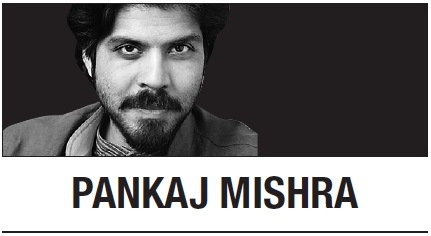On the face of things, Narendra Modi has failed variously and spectacularly as India’s prime minister. After pledging to create millions of jobs, he has -- according to a leaked government report -- presided over a dramatic rise in unemployment among young Indians. Vowing to vanquish terrorism, he took most currency notes out of circulation and cracked down hard in the state of Jammu and Kashmir. Kashmir has since witnessed a sharp spike in militancy and its biggest terrorist attack in years.
Swearing ferocious vengeance against Pakistan, Modi has had to resort to dubious claims about destroyed terrorist camps and hundreds of dead Pakistanis in order to appear a man of his word. Indeed, in an effort to back up claims that India’s economy has grown faster under his leadership than under his predecessors, his government has even imperiled the credibility of India’s official data.
Yet, it seems likely that Modi will return to power next month at the head of a coalition government. What explains his Teflon premiership? Arguably, it’s the same thing that propels other masters of generating slick, seductive and unreal narratives such as US President Donald Trump and Instagram megastar Kylie Jenner.
Certainly, no electoral arithmetic alone can account for Modi’s chemistry with many young Indians. He has cast a spell on them -- and it is the nature of that unprecedented enchantment that ought to be examined.
On the day of his election in May 2014, I described him as India’s “canniest artist,” who mesmerized restless youth with fantastical visions of the Indian past and future, as well as his own abilities. It seemed clear even five years ago that Modi’s main stock-in-trade was illusion and that to fault him for his hostility to facts or indifference to rational discourse was beside the point.
Since then, India’s online population has doubled. Smartphones with cheap data plans have appeared in the hands of the poorest of Indians. That’s created one of the biggest markets in the world for apps such as Facebook and WhatsApp, two major sources of disinformation.
This has in turn augmented Modi’s ability to create virtual realities and to persuade a significant number of Indians to inhabit these shiny illusions.
To credit his appeal to his authoritarian ways is not to say much. It should be clear by now that Modi is no aloof autocrat or emotionally underpowered dynast such as Indira Gandhi, the Indian prime minister to whom he is often and inaccurately compared.
A champion tweeter, he delivers his rousing speeches in fancy dress, embodying a now-commonplace compulsion for political leaders to perform as regularly as the influencers of Instagram and YouTube -- to put themselves on permanent display without aesthetic or moral inhibition. In the pseudo-egalitarian spirit that prevails on social media, he still presents himself to his primary audience of ambitious young strugglers as one of them: a self-made, self-optimizing individual.
Unquestionably, his impassioned assertions -- whether about his 142-centimeter chest, his poverty-blighted childhood or his loathing of entitled dynasts -- belong to an unabashed and noisily democratic culture of exhibitionism rather than to the cold and forbidding climate of autocracy.
He may have failed to remove the crippling limits on socioeconomic mobility for most Indians. But, he has deftly compensated for the lack of such substantive freedom by facilitating and popularizing highly expressive forms of liberty. These include not only the freedom to play (for instance, to consume videos on smartphones, a fast-growing addiction among the laboring as well as leisure classes in India), but also to communicate far and wide, and, most importantly, to ventilate strong, often hateful, emotions.
It’s hardly surprising then that Modi has sustained his electoral appeal largely through overhyped “surgical” strikes on Pakistan (eulogized recently in a Bollywood-style music video that has gone viral) and sensationalized reports of mass casualties, or that his fans are never more energized than when attacking beef-eating Muslims, liberals and other allegedly “anti-national” Indians.
If Modi’s economic record matters much less than it should to his supporters, it is because Modi has vastly enriched their private lives of fantasy. A maestro of digital psycho-politics, Modi has succeeded in reconfiguring the psyche of voters even as he has failed to enhance their opportunities in the real world.
To grasp the singular phenomenon he represents, the analytical tools of political science, history, sociology and psephology no longer seem enough. They have to be supplemented with what we possess only in underdeveloped form: an anthropology of our digital age.
For Modi is now only superficially like a conventional leader with party, ideology, manifesto and electoral campaign. With his shrewd grasp of the prevailing cyber-culture of aggressive self-optimization and extravagant self-regard, he seems more akin to the current monarchs of social media. His opponents have as much chance of keeping up with him as they do with the Kardashians.
Pankaj MishraPankaj Mishra is a Bloomberg Opinion columnist. -- Ed.
(Bloomberg)





![[KH Explains] How should Korea adjust its trade defenses against Chinese EVs?](http://res.heraldm.com/phpwas/restmb_idxmake.php?idx=645&simg=/content/image/2024/04/15/20240415050562_0.jpg&u=20240415144419)
